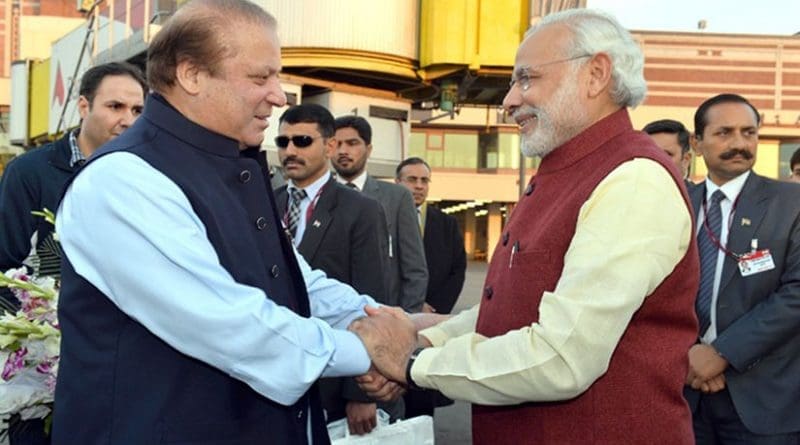A Summit Of Sorts – OpEd
It was a calculated risk. In 2007, Manmohan Singh had dared to dream of having breakfast in Amritsar, lunch in Lahore and dinner in Kabul. But, India’s Prime Minister Narendra Modi made it happen by dropping in for tea with Pakistan’s Prime Minister Nawaz Sharif on December 25th2015 while returning from a two-day visit to Afghanistan.
For the world’s media, the bonhomie was associated with Christmas and the year-end celebrations. They missed the most important: It was Nawaz Sharif’s birthday and that of Atal Bihari Vajpayee – the last Indian leader to have met a Pakistani Prime Minister.
It was a favor being returned. Nawaz Sharif had displayed charismatic statesmanship by accepting Narendra Modi’s invitation on May 26th 2014 as a leap of faith against hardliners and India-baiters in Pakistan. So, when, in a telephonic conversation with Mr Modi who had called to wish him on his 66th birthday, Mr Sharif invited him to Lahore, Mr Modi accepted. And, the 150-minute meeting that happened in a flurry was received graciously by both nations. It only underlines the reasons; the Indian public brought Narendra Modi to power in such an overwhelming manner. India’s PM has an out-of-the-box thinking that could only help manoeuvre India-Pakistan’s relations towards normalcy.
And, just as Mr Vajpayee’s attempts to further peace with Sharif in 1999 were sabotaged by the Pakistan Army Chief Parvez Musharraf who invaded the de-facto border to launch a blitzkrieg on Kargil, comes the attack on the Air Force base at Pathankot. While then, Nawaz Sharif’s efforts to sack Musharraf led to a military coup, installation of Musharraf as President and the exile of Sharif till 2007, today Nawaz Sharif finds himself in a not-so-unique position. The attack on Pathankot was expected.
During a speech to the Afghan Parliament on the same day, Mr Modi bluntly said, “Afghanistan will succeed only when terrorism no longer flows across the border, when nurseries and sanctuaries of terrorism are shut. Terror and violence cannot be the instrument to shape Afghanistan’s future or dictate the choices Afghans make.” And, just like Vajpayee, Mr Modi extracted a promise ofcooperation from Pakistan in the global fight against terrorism. Mr Modi’s stand on terror has been resolute.
Meanwhile, at the highest levels, the Indian side has been informed that the Pathankot attack was carried out with the full knowledge of the Pakistan Army Chief General Raheel Sharif. India’s intelligence agencies feel that the Pakistan army is not fully on board with Nawaz Sharif’s efforts to forge peace with India.At a meeting recently, Gen Raheel Sharif reportedly told Pakistan PM Nawaz Sharif that he was free to pursue talks with PM Modi if he wanted, but the Pakistan army will take no action against Pakistan-based terrorists who were operating against Indian interests.
The Western-dominated international community has been predictably silent on the issue. Why, even Musharraf was never held to account by the community for his Kargil misadventure that thwarted the most promising bilateral diplomacy in decades, nor for his military coup, nor for his double dealings in Afghanistan.
Pakistan was carved on the premise that Muslims of the sub-continent could not co-exist with Hindus. The existence of a Muslim-majority Kashmir as an Indian state clashes directly with the core identity of Pakistan. However, India’s core identity that includes secularism does not permit losing its only Muslim-majority province – Kashmir, as that would thwart India’s very foundation.
Now, while the Pathankot attack has been reduced to a hush, the threat for India stays…and so does the threat for Sharif. While departing from diplomatic channels and cabinet decision-making, Mr Modi displayed informal grace and demystified the whole gamut of ‘bilateral relationships’ and pushed home the fact that not all ‘talks’ are summits that end with substantial outcomes. Mr Modi was welcomed at Lahore airport by Sharif who hugged him before the two walked hand in hand on the red carpet from the plane to a waiting helicopter to fly to Sharif’s home. Mr Modi gave a Indian dress to the bride – Sharif’s grand-daughter – as a wedding gift too. It was a summit of sorts. A summit of relationship building…of a bonhomie that wasn’t conditional…not on Kashmir, religion, territory, power or terror.
While the world watches the two neighbouring states scuffle and fight, these two leaders stand tall towering above all differences that are reduced to a naught.
In engaging the world’s leaders in general and India’s neighbours, in particular, right from the onset at the installation of his government on May 26th2014 when he invited South Asian leaders till date, during which he travelled extensively, bridging differences and building ties…he hits terror the worst. It’s the groups who thrive on hate, instability and bickering who buffer the blow to terror which concurrently flourishes.
Mr Modi knows that and works endlessly to uproot it…in a manner only he can.

